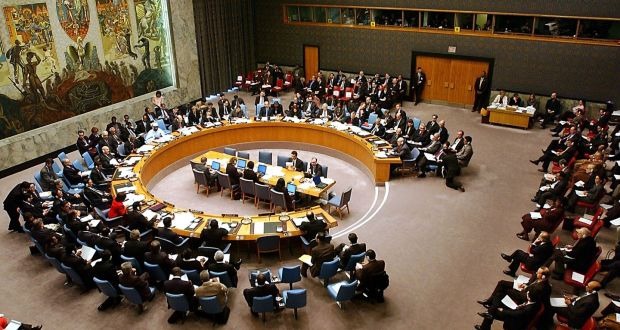The United Nations publishes a long-awaited report on terrorism in Africa. The UN welcomes the "weakening" of the Islamic State. But the reality is more complex.
The death of several senior commanders of terrorist groups in Africa in recent months has "caused the desertion of thousands of fighters", says a United Nations report. The document, entitled "Islamic State in Africa, trends and developments", surprised from its introduction, the UN considering that terrorist crimes in Africa are the monopoly of a single group.
The UN report was drawn up by fifty representatives of African civil society organisations, from 15 States. Obviously, these States are not at all the main ones concerned by the wave of terrorist attacks which have shaken several African regions for more than ten years. And among these 50 specialists, barely seven are African, including three Ivorians, one Djiboutian and two Egyptians, all employees of the United Nations Committee for the Fight against Terrorism (CTED).
A representativeness which questions, but which does not settle with the paradoxes between the observation of the UN and terrorist crime whose damage is only increasing over the years.
For the United Nations, the successive deaths of Abubakar Shekau, Abou Mosab al-Barnaoui - the two leaders of Boko Haram, killed during an internal conflict - and the leader of the EIGS Adnane Abou Walid al-Sahraoui, presumed dead after a French bombardment last August, would be the signs of the “inevitable end of the Islamic State in Africa”.
However, in Nigeria as in the “tri-border area” where the groups of these three terrorist group commanders operate, the violence is only increasing and spreading beyond its natural confines.
4) Going to specific peace and security issues, the first issue highlighted is what our report calls 'the rise and rise of terrorism' highlighting its spike & geographic expansion, affecting more than one fourth of AU member states and all regions pic.twitter.com/08dkTZ61Yy
— Amani Africa (@africa_amani) April 5, 2022
A subjective report that "seriously lacks professionalism"
One thing is certain, however. Despite past opposition by the United Nations to the arbitrary classification of African terrorist groups as "affiliated with the Islamic State" by the United States, the trend is rapidly changing.
"These developments (the death of terrorist leaders, editor's note) represented an opportunity for a renewed and holistic approach that took into account the local aspects of the phenomenon, used transitional justice approaches and prevention mechanisms to strengthen the resilience of states, strengthened pathways out of conflict and included measures to prevent violent extremism conducive to terrorism,” the UN report said.
For the CTED, the authorities “have not taken advantage of the positive role that civil society and women can play in preventing terrorism, building resilience and reintegrating former combatants”. But, at the same time, “the progress of certain countries like Cameroon is encouraging. African countries should “engage with terrorist fighters and groups, including through local community and religious leaders, in areas where there is a lack of trust in government,” CTED said.
We can read many surprising expressions, such as when the UN speaks of the "vital role of the United States in the training of the armies of the countries of the region", or in "the rehabilitation of people associated with Boko Haram or EIGS" .
On the other hand, the report does not fail to denounce "the lack of adequate criminal justice", "the lack of coordination of the security forces", the "lack of transparency" or even "corruption, unemployment, bad governance " in Africa.
The terrorists targeted by the United States are not the only enemies of Africa
Specifically, besides a supposed American victory, and an imaginary end to the threat of the Islamic State in Africa, the UN report "seriously lacks professionalism" and would be "challenged by experts", according to British security and terrorism specialist Nicky Harley.
A finding that would be difficult to dispute. The UN report used figures mostly from 2015, and from non-governmental parties, with the exception of the US Congressional Research Service (CRS).
While the United Nations, precisely, congratulates the Americans for their efforts in the fight against terrorism in Africa, the NGO omits all the terrorist attacks in Africa in 2021. A record in terms of the number of attacks and civilian victims, including also an extension of the terrorist threat in Africa. Benin, Ivory Coast, Togo, Tanzania and Malawi saw their first attacks in years, claimed by terrorist groups affiliated with the Islamic State, last year. In Nigeria, Cameroon, DRC and Somalia, the violence of terrorist groups has never caused so many victims since 2016 for the most recent record in these countries.
While it is therefore true that the Islamic State in the Greater Sahara (EIGS) and Boko Haram are both desperate thanks to many factors, the violence has never stopped in the countries most affected by the attacks of these groups. And in these countries, namely Nigeria, Mali and Burkina Faso, the authorities and the local press speak more and more of “bandits” or “armed groups” without distinction. Because, despite what the UN seems to think, the terrorists targeted by the United States are not the only enemies of African countries.
“ISIL's continued presence in Syria, Iraq, Afghanistan and Africa demonstrates that assassinations of leaders can not be seen as an effective long-term strategy in the fight against armed groups.”
— #AJOpinion by @ialmarashi https://t.co/6aqZHwjt3D
- Al Jazeera English (@AJEnglish) March 29, 2022
